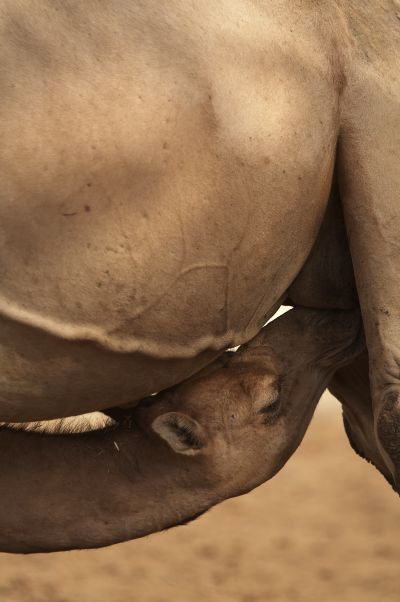Desert camel a new fixture at Dutch dairy

(AFP) -
Looking out of place against the lush Dutch maize fields, a few dozen camels saunter about between twice-daily milking sessions on Europe's only commercial camel dairy farm.
Braying loudly and grazing lazily, the desert animals are the pet project of 26-year-old Dutch farmer Frank Smits, who overcame much ridicule and bureaucracy to start his unique venture.
"I started in 2006 with three dromedaries (camels with only one hump). I have 40 today, of which 10 produce milk," Smits told AFP on his farm in the northern town of Cromvoirt.
Describing himself as a "cow fanatic" who studied marketing and agriculture, Smits said he switched his attention to camels after reading about the virtues of their milk.
It is less fatty and lower in lactose than cow's milk, he said, but sweeter to drink.
According to the UN's Food and Agricultural Organisation (FAO), camel's milk is more nutritious than many others and easier to digest for diabetics and lactose intolerant individuals.
Smits sells about 60 litres (quarts) a day to a niche market comprised mostly of Turkish and Moroccan immigrants who traditionally drink camel's milk in their native countries.
"I sell my milk for six euros (nearly nine dollars) a litre to about 50 Turkish, Arabic and organic food shops in the Netherlands, Belgium and the United Kingdom," he said, but admitted that he had not yet turned a profit.
"I refuse to work with large retail chains who offer farmers ridiculously low prices," he said.
Smits said his farm should become profitable within two years once he has 15 milk producing camels. Camels reach calf-bearing, and thus milk-producing age, at about four. "In the long run, I hope to have 40."
The dromedaries are milked one by one, morning and night, by a machine specially adapted to their teats. Each cow provides about six litres of milk per day, compared to about 30 litres from a cow.
-- These animals adapt well --
"They can be very stubborn and only give milk if their young are close by," said Martijn Spierings, 21, who volunteers as a farm helper.
"At the slightest stress, the source dries up."
Of the 40 animals on the farm, a dozen have given birth to young. Most of the others are pregnant -- all from the sole male of the group.
Smits' start in the business was not easy, he said.
"I had to find the camels, endure the scepticism of people around me and the protests of animal activists."
Under European Union regulations, camels cannot be imported from outside Europe but after searching for several months, Smits managed to find a few specimens in Spain's Canary Islands.
He scraped together his savings and borrowed some money to buy his first camels at 7,000 euros (about 10,000 dollars) a piece.
He said he jumped through hoops to meet stringent conditions for obtaining a production permit, and stated proudly that his milk meets all the sanitary standards.
One hurdle was the fact that camel's milk is never pasteurised -- "otherwise it loses all its qualities," said Smits.
Anton Mentink of the Netherlands Controlling Authority for Milk and Milk Products (COKZ) said his service conducts regular checks at the camel dairy because of a risk factor in unpasteurised milk but "there have been no problems so far."
"We know this farm well, it has all the required permits and meets all our health and hygiene standards," Mentink said.
Smits believes his farm can serve as a good case study for animal activists who initially opposed his plans.
"I can be used as an example for other farmers, the camels walk around freely and everything is organic.
Smits now plans to develop new camel milk products like chocolate, ice cream, cheese and soap for people with conditions like diabetes or eczema.
Making cheese has proven more difficult, he said, as camel's milk has no casein, a milk protein that acts as a binding agent.
"We are still experimenting," said Smits, who said he had plans to move to bigger premises soon.
"These animals adapt very well to our temperate climate," added Spierings. "They fear only humidity. When it rains and at night, we bring them to the stable."
According to the FAO, some 1.3 million tons of camel's milk are produced for human consumption annually.
mpa/mlr/ns
Join our commenting forum
Join thought-provoking conversations, follow other Independent readers and see their replies
Comments
Bookmark popover
Removed from bookmarks